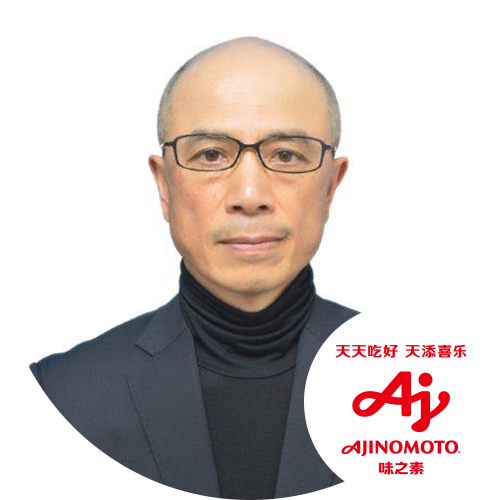
Kenichi Mizogami joined the Ajinomoto Group in 1992 and has worked in a variety of fields, including sales and marketing for the Japanese market, development and management of new overseas businesses, and human resources. In addition to product development, production, and sales and marketing, he also has extensive experience in human resources development, organizational culture development. Since 2021, he has been in charge of the seasoning business in China. Actively learning from customer needs and the Chinese market situation, and combining the resources of the Ajinomoto Group, such as unique technologies, lead the team to work to customer problem solutions.
Over the past century, Ajinomoto has transformed from a small Japanese seasoning company into a global food giant. Today, its products are sold in over 130 countries and regions, with a portfolio spanning more than 100 subsidiaries. Beyond traditional seasonings, Ajinomoto has expanded into pharmaceuticals, health foods, and sports nutrition. In 2023, the company achieved $9.86 billion (approximately ¥70.1 billion RMB) in revenue.
Global Expansion: Tracing Ajinomoto’s journey from Japan to international markets, this session explores its market entry strategies and localization practices in key regions such as Southeast Asia and North America.
Product Innovation & Localization: Ajinomoto has tailored its offerings to diverse culinary cultures, from Sajiku seasoning mix in Southeast Asia to health-focused product lines in North America. This discussion delves into how the company develops region-specific innovations to meet local consumer preferences.
Technology & Supply Chain Optimization: Leveraging amino acid technology, production automation, and supply chain enhancements, Ajinomoto continuously strengthens its global competitiveness.
Future Outlook: Looking ahead, Ajinomoto is actively expanding into health foods and pharmaceuticals, exploring opportunities and challenges in emerging global markets.
In today's ever-changing landscape, the food and beverage market is facing unprecedented challenges and opportunities:
· The trend toward health and consumers' demand for high-quality products are driving the industry to accelerate its transformation from traditional products to innovative directions.
· In 2023, the Chinese sugar-free tea market grew by 110% year-over-year (Nielsen data). Behind the explosive growth of this category, competition has intensified, homogenization has become more prominent, and brands are trapped in the dilemma of "competing on price" to boost sales.
· Chinese food and beverage brands are accelerating their international expansion, with total exports reaching $76.5 billion in 2023. However, the share of sales from independent brands abroad remains limited. Breaking out of the Chinese community and penetrating local markets remains a key challenge for brands venturing abroad...
Against this backdrop, Calbee achieved a V-shaped sales rebound for its fries, which were once on the brink of discontinuation, through "differentiated taste"; Amos secured a foothold in international markets with its fun gummy designs featuring "multi-sensory" appeal; Kirin's Seicha "broke through the siege" with a brand renewal, achieving over 100 million in sales in just seven weeks; House Foods redefined children's curry with a "mild-spicy formula," selling 82.4 billion servings globally (as of December 2022); Meiji successfully revived its dormant bitter chocolate after 17 years with the "cocoa polyphenols" concept; Brands like Wantwant, Jianlibao, and Baixiang have remained timeless, continually thriving in the tide of the times through strong brand building and product strength. These practices, transcending regions and periods, show how brands respond to market fluctuations through product innovation and reveal a product philosophy that transcends cycles: starting with deep consumer insights, blending technology and creativity, driving qualitative breakthroughs, and ultimately achieving growth.
This dialogue brings together representative brands of global product innovation to discuss how to achieve sustainable growth and breakthroughs in the rapidly changing market environment:
· The underlying logic of product innovation: How can we start with authentic insights to create truly globally appealing classic products?
· Building long-term brands: How can we build brand competitiveness that spans cycles and enables steady growth in the global market?
· Advancing overseas expansion strategies: Going abroad is more than just export—how can we deeply cultivate target markets, continue innovating, and achieve steady growth?
By reviewing classic cases that have broken through in challenging times and anticipating future industry trends, how can food and beverage companies learn in competition and co-create in cooperation? This dialogue will offer new directions for thinking and lead a new wave of global market growth.

